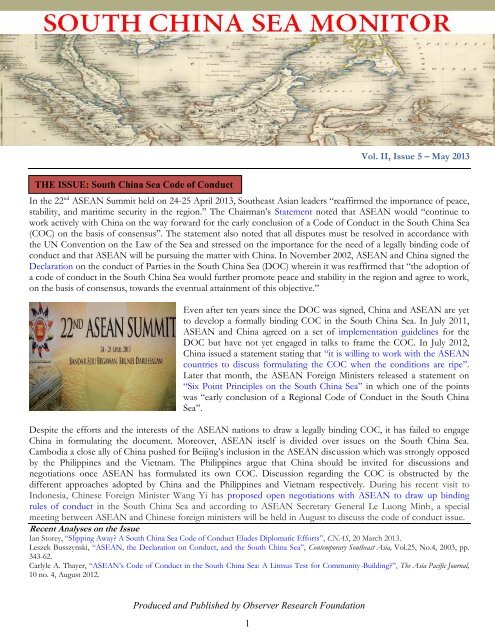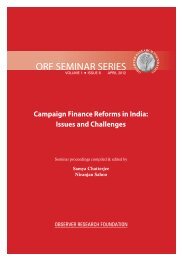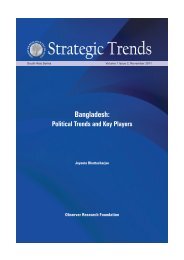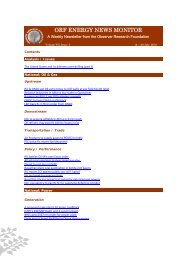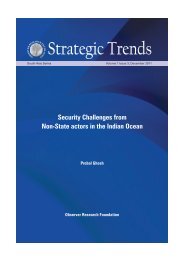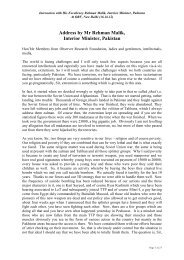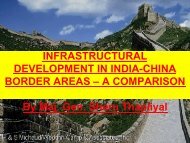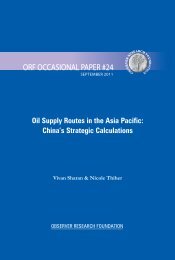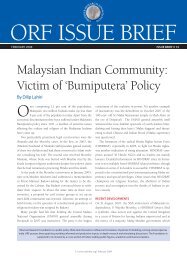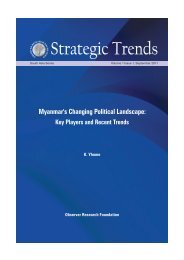Produced and Published by Observer Research Foundation 1 Vol. II ...
Produced and Published by Observer Research Foundation 1 Vol. II ...
Produced and Published by Observer Research Foundation 1 Vol. II ...
Create successful ePaper yourself
Turn your PDF publications into a flip-book with our unique Google optimized e-Paper software.
<strong>Vol</strong>. <strong>II</strong>, Issue 5 – May 2013<br />
THE ISSUE: South China Sea Code of Conduct<br />
In the 22 nd ASEAN Summit held on 24-25 April 2013, Southeast Asian leaders “reaffirmed the importance of peace,<br />
stability, <strong>and</strong> maritime security in the region.” The Chairman’s Statement noted that ASEAN would “continue to<br />
work actively with China on the way forward for the early conclusion of a Code of Conduct in the South China Sea<br />
(COC) on the basis of consensus”. The statement also noted that all disputes must be resolved in accordance with<br />
the UN Convention on the Law of the Sea <strong>and</strong> stressed on the importance for the need of a legally binding code of<br />
conduct <strong>and</strong> that ASEAN will be pursuing the matter with China. In November 2002, ASEAN <strong>and</strong> China signed the<br />
Declaration on the conduct of Parties in the South China Sea (DOC) wherein it was reaffirmed that “the adoption of<br />
a code of conduct in the South China Sea would further promote peace <strong>and</strong> stability in the region <strong>and</strong> agree to work,<br />
on the basis of consensus, towards the eventual attainment of this objective.”<br />
Even after ten years since the DOC was signed, China <strong>and</strong> ASEAN are yet<br />
to develop a formally binding COC in the South China Sea. In July 2011,<br />
ASEAN <strong>and</strong> China agreed on a set of implementation guidelines for the<br />
DOC but have not yet engaged in talks to frame the COC. In July 2012,<br />
China issued a statement stating that “it is willing to work with the ASEAN<br />
countries to discuss formulating the COC when the conditions are ripe”.<br />
Later that month, the ASEAN Foreign Ministers released a statement on<br />
“Six Point Principles on the South China Sea” in which one of the points<br />
was “early conclusion of a Regional Code of Conduct in the South China<br />
Sea”.<br />
Despite the efforts <strong>and</strong> the interests of the ASEAN nations to draw a legally binding COC, it has failed to engage<br />
China in formulating the document. Moreover, ASEAN itself is divided over issues on the South China Sea.<br />
Cambodia a close ally of China pushed for Beijing’s inclusion in the ASEAN discussion which was strongly opposed<br />
<strong>by</strong> the Philippines <strong>and</strong> the Vietnam. The Philippines argue that China should be invited for discussions <strong>and</strong><br />
negotiations once ASEAN has formulated its own COC. Discussion regarding the COC is obstructed <strong>by</strong> the<br />
different approaches adopted <strong>by</strong> China <strong>and</strong> the Philippines <strong>and</strong> Vietnam respectively. During his recent visit to<br />
Indonesia, Chinese Foreign Minister Wang Yi has proposed open negotiations with ASEAN to draw up binding<br />
rules of conduct in the South China Sea <strong>and</strong> according to ASEAN Secretary General Le Luong Minh, a special<br />
meeting between ASEAN <strong>and</strong> Chinese foreign ministers will be held in August to discuss the code of conduct issue.<br />
Recent Analyses on the Issue<br />
Ian Storey, “Slipping Away? A South China Sea Code of Conduct Eludes Diplomatic Efforts”, CNAS, 20 March 2013.<br />
Leszek Busszynski, “ASEAN, the Declaration on Conduct, <strong>and</strong> the South China Sea”, Contemporary Southeast Asia, <strong>Vol</strong>.25, No.4, 2003, pp.<br />
343-62.<br />
Carlyle A. Thayer, “ASEAN’s Code of Conduct in the South China Sea: A Litmus Test for Community-Building?”, The Asia Pacific Journal,<br />
10 no. 4, August 2012.<br />
<strong>Produced</strong> <strong>and</strong> <strong>Published</strong> <strong>by</strong> <strong>Observer</strong> <strong>Research</strong> <strong>Foundation</strong><br />
1
MEDIA WATCH COMMENTARIES REPORT<br />
Chinese officials fill up first<br />
Sansha cruise in disputed seas<br />
ASEAN, Chinese Foreign<br />
Ministers to meet over South<br />
China Sea disputes<br />
South China Sea disputes<br />
dominate first day of ASEAN<br />
summit<br />
ASEAN upbeat on progress on<br />
South China Sea<br />
Eight Chinese vessels enter<br />
Senkaku area<br />
Chinese navy patrols Diaoyu<br />
Isl<strong>and</strong>s on treaty anniversary<br />
China accuses Japan of ‘making<br />
trouble’ over Senkaku Isl<strong>and</strong>s<br />
China points finger at U.S. over<br />
Asia-Pacific tensions<br />
Chinese navy continues highsea<br />
training<br />
Japan, Vietnam to hold maritime<br />
security talks in May<br />
Japan, Taiwan agree on fishing<br />
zone near disputed isl<strong>and</strong>s<br />
China to boost maritime<br />
training, says PLA Navy's Jiang<br />
Weilie<br />
India’s interest in the South<br />
China Sea: Freedom of<br />
Navigation<br />
- Darshana M. Baruah<br />
The South China Sea (SCS) is<br />
major Sea Line of Communication<br />
(SLOC) <strong>and</strong> an important trade<br />
route. Conflict in the area concerns<br />
all Asian nations including India.<br />
Though India is not a claimant in<br />
the territorial disputes in the region it<br />
holds an interest in the Freedom of<br />
Navigation (FON). China treats<br />
the SCS as its internal waters which<br />
invariable affects India’s interest.<br />
New Delhi has reiterated its stance<br />
on the “Freedom of Navigation”<br />
underlining the necessity for<br />
uninterrupted access to international<br />
waters. India must st<strong>and</strong> committed<br />
to its rhetoric on the FON <strong>and</strong> to<br />
defend its interests should the need<br />
arise. This in turn would involve<br />
deepening naval cooperation with the<br />
key countries of the ASEAN <strong>and</strong><br />
major powers sharing India’s interest<br />
in defending the principle of FON.<br />
This article looks at India’s primary<br />
interest in the SCS in the context of<br />
growing Chinese assertiveness.<br />
Interaction with Vice Admiral<br />
Scott H. Swift, Comm<strong>and</strong>er,<br />
US 7 th Fleet<br />
The United States is in a unique<br />
situation where it continues to say it<br />
does not take a position in the<br />
territorial disputes in South China<br />
Sea <strong>and</strong> East China Sea, but it has<br />
treaty obligations with Japan<br />
Thail<strong>and</strong> <strong>and</strong> the Philippines. If<br />
these countries were attacked, the<br />
US would be compelled to invoke the<br />
treaty obligations, Admiral Swift<br />
said during an interaction with<br />
ORF scholars.<br />
BIBLIOGRAPHY<br />
The section provides a list of recent<br />
publications on the South China<br />
Sea disputes:<br />
ARTICLES<br />
COMMENTARIES<br />
PAPERS<br />
REPORTS<br />
<strong>Produced</strong> <strong>and</strong> <strong>Published</strong> <strong>by</strong> <strong>Observer</strong> <strong>Research</strong> <strong>Foundation</strong><br />
2
MEDIA WATCH<br />
Chinese officials fill up first<br />
Sansha cruise in disputed seas<br />
More civil servants than actual<br />
tourists climbed aboard the first<br />
Chinese cruise ship to visit<br />
disputed South China Sea isl<strong>and</strong>s<br />
on 28 April. Only 100 of 240<br />
passengers were regular citizens,<br />
the Shanghai<br />
Morning<br />
Post reported on 29 April. The rest<br />
were civil servants from various<br />
government organs in Hainan<br />
province. The debut cruise went to<br />
the Paracel Isl<strong>and</strong>s' Sansha, the<br />
newly established prefecture-level<br />
city created last year to consolidate<br />
China's de facto control. As many<br />
as 100 tourists paid between 7,000<br />
Yuan (HK$8,800) <strong>and</strong> 9,000 Yuan<br />
for the four-day voyage, but stayed<br />
in second-class cabins or lower.<br />
Officials <strong>and</strong> civil servants,<br />
however, were free to choose more<br />
luxurious cabins <strong>and</strong> pay less, the<br />
report said. A price chart obtained<br />
<strong>by</strong> the newspaper also showed that<br />
tourists were charged an extra<br />
3,250 Yuan per person than civil<br />
servants in similar cabins. But the<br />
newspaper said the tourists were<br />
not bothered <strong>by</strong> the unequal<br />
treatment. A Hunan passenger<br />
surnamed Ma said it was worth the<br />
money to experience the “original<br />
beauty” of Sansha. Everyone was<br />
subjected to the same high security<br />
checks during boarding, however.<br />
Passengers went through security<br />
checks twice, taking two hours for<br />
the whole process, the newspaper<br />
said. Plans to allow tourists to visit<br />
the Paracel Isl<strong>and</strong>s are the latest<br />
stage in China’s development of<br />
the territory, which has previously<br />
angered Vietnam <strong>and</strong> caused<br />
concern in Washington. Officials<br />
earlier this month confirmed they<br />
would open up the isl<strong>and</strong>s to<br />
tourism.<br />
Source: South China Morning Post, 29<br />
April 2013<br />
ASEAN, Chinese Foreign<br />
Ministers to meet over South<br />
China Sea disputes<br />
Secretary-General of Association of<br />
South East Asian Nations<br />
(ASEAN) Le Luong Minh said on<br />
29 April that foreign ministers of<br />
ASEAN member countries will<br />
have a meeting with their Chinese<br />
counterpart in Beijing to further<br />
discuss peaceful settlement on<br />
territorial disputes in the South<br />
China Sea. "The meeting between<br />
ASEAN foreign affairs ministers<br />
<strong>and</strong> Chinese foreign affairs minister<br />
has been scheduled in August or<br />
September this year in Beijing,"<br />
Minh told Xinhua on the sidelines<br />
of a media briefing on the results of<br />
the recent high-profile ASEAN<br />
Summit held in B<strong>and</strong>ar Seri<br />
Begawan, Brunei. He said that<br />
during the summit, all ASEAN<br />
members agreed to assign their<br />
foreign ministries to continue to<br />
work actively with China on the<br />
way forward for early conclusion of<br />
a Code of Conduct in the South<br />
China Sea (COC) on the basis of<br />
consensus. In his briefing, Minh<br />
said that ASEAN leaders<br />
reaffirmed the importance of<br />
peace, stability <strong>and</strong> maritime<br />
security in the region. They also<br />
underscored the importance of the<br />
Declaration on the Conduct of<br />
Parties in the South China Sea<br />
(DOC), ASEAN's six-point<br />
Principles on the South China Sea<br />
<strong>and</strong> the Joint Statement of the 10th<br />
anniversary of the DOC. "In this<br />
regard, we reaffirmed the collective<br />
commitments under the DOC to<br />
ensuring the peaceful resolution of<br />
dispute in accordance with<br />
universally recognized principles of<br />
international law, including the<br />
1982 United Nations Convention<br />
on the Law of the Sea without<br />
resorting to the threat or use of<br />
force, while exercising self-restraint<br />
in the conduct of activities," Minh<br />
said in the briefing. He added that<br />
ASEAN is looking forward to<br />
continued engagement with China<br />
in implementing the DOC in a full<br />
<strong>and</strong> effective manner, including<br />
through mutually agreed joint<br />
cooperative activities <strong>and</strong> projects.<br />
Source Xinhua, 29 April 2013<br />
South China Sea disputes<br />
dominate first day of ASEAN<br />
summit<br />
Territorial disputes in the South<br />
China Sea dominated the first day<br />
of a meeting of the leaders of the<br />
ASEAN, Philippine President<br />
Benigno Aquino said on 25 April.<br />
"Everybody is interested in having<br />
a peaceful resolution <strong>and</strong> also<br />
invoicing their concern that there<br />
have been increasing sea disputes,"<br />
he told reporters in a briefing at the<br />
Philippine Embassy in the capital<br />
of B<strong>and</strong>ar Seri Begawan. Aquino<br />
said Brunei Sultan Hassanal<br />
Bolkiah, chairman of ASEAN this<br />
year, immediately brought out the<br />
topic of the South China Sea <strong>and</strong><br />
the need to seek peaceful resolution<br />
of the disputes during the start of<br />
the two-day summit on 24 April.<br />
He added that as far as the<br />
Philippines is concerned; a legally<br />
binding code of conduct among<br />
countries with overlapping<br />
<strong>Produced</strong> <strong>and</strong> <strong>Published</strong> <strong>by</strong> <strong>Observer</strong> <strong>Research</strong> <strong>Foundation</strong><br />
3
territorial claims in the South China<br />
Sea would greatly ease tensions that<br />
have increased after recurring<br />
confrontations in the area. "There<br />
might be a consensus that we have<br />
to reach that really pushes the<br />
matter forward to really define<br />
everybody’s entitlements <strong>and</strong><br />
obligations," he said.<br />
Source: The Nation, 25 April 2013<br />
ASEAN upbeat on progress on<br />
South China Sea<br />
The ASEAN chair <strong>and</strong> Brunei<br />
leader on 25 April said that<br />
progress has been made during the<br />
ongoing summit of Southeast Asian<br />
leaders to push ahead with talks<br />
with China, bringing renewed<br />
optimism to the South China Sea<br />
issue. Brunei's Sultan Haji Hassanal<br />
Bolkiah told media during the last<br />
day of the 22nd ASEAN Summit<br />
that he was positive of the progress<br />
that has been achieved during talks<br />
between the 10 member states. He<br />
urged communication lines<br />
between the different countries to<br />
be kept open <strong>and</strong> called for<br />
stronger engagement to find a<br />
mutually acceptable solution<br />
between China <strong>and</strong> ASEAN<br />
claimants. "I believe that there are<br />
important practical procedures to<br />
achieve. For example if there is a<br />
storm at sea <strong>and</strong> fishermen shelter<br />
in the disputed waters, such an<br />
event can be misunderstood <strong>and</strong><br />
can cause unnecessary tension," he<br />
said. "Therefore it is important to<br />
establish a practical mechanism to<br />
deal with such instances such as<br />
hot lines between the relevant<br />
countries. It is my intention to<br />
continue discussions on such<br />
points," he added. The Chairman's<br />
Statement released at the summit<br />
also detailed expectations for<br />
continued engagement with China<br />
in implementing the Declaration on<br />
the Conduct of Parties in the South<br />
China Sea (DOC) in a "full <strong>and</strong><br />
effective manner.""We have tasked<br />
our ministers to continue to work<br />
actively with China on the way<br />
forward for the early conclusion of<br />
a Code of Conduct (COC) in the<br />
South China Sea on the basis of<br />
consensus," it added. Indonesia's<br />
Foreign Minister Marty Natalegawa<br />
had earlier noted that there is no<br />
date set to launch formal<br />
negotiations between ASEAN <strong>and</strong><br />
China on COC in the disputed<br />
waters. Meanwhile, the ASEAN<br />
Secretary-General Le Luong Minh<br />
said on 25 April the bloc will come<br />
to the negotiating table as a group<br />
in South China Sea talks with<br />
China. "The South China Sea issue<br />
is not just about competing claims;<br />
it's about peace <strong>and</strong> stability in the<br />
region," Le told Xinhua in an<br />
interview on the sidelines of the<br />
summit. "Of course, it should be<br />
resolved among countries involved,<br />
but it also concerns the interest of<br />
other parties, concerns peace <strong>and</strong><br />
stability of the region," he said,<br />
adding, "The South China Sea is an<br />
important sea lane for the region<br />
<strong>and</strong> the world. Maritime security<br />
should be protected. "ASEAN is<br />
always willing <strong>and</strong> open to engage<br />
with China on this issue; we've<br />
already done this at the 19th<br />
ASEAN-China Senior Officials'<br />
Consultations. We've also agreed<br />
with the Chinese side to hold a<br />
ministerial level meeting later this<br />
year," said Le at the summit.<br />
Source: Global Times, 25 April 2013<br />
Eight Chinese vessels enter<br />
Senkaku area<br />
Eight Chinese maritime<br />
surveillance vessels entered<br />
Japanese territorial waters on 24<br />
April around the Senkaku Isl<strong>and</strong>s<br />
in the East China Sea, the Japan<br />
Coast Guard said. China’s State<br />
Oceanic Administration said the<br />
vessels were there to monitor the<br />
activity of a flotilla of boats<br />
reportedly carrying members of a<br />
Japanese nationalist group. China<br />
regards the area as its territorial<br />
waters. This incident marks the<br />
highest number of Chinese ships<br />
that have entered the Japanese<br />
waters near the Senkakus since the<br />
Japanese central government<br />
purchased three of the Isl<strong>and</strong>s<br />
from their Saitama owner last<br />
September, <strong>and</strong> effectively<br />
nationalized the chain, according to<br />
the 11th Regional Coast Guard<br />
Headquarters in Naha, Okinawa<br />
Prefecture. The Foreign Ministry<br />
said it summoned the Chinese<br />
ambassador <strong>and</strong> lodged a protest<br />
over the maritime activity. “It is<br />
extremely regrettable <strong>and</strong><br />
unacceptable that Chinese state<br />
ships continue to engage in<br />
intrusion,” Chief Cabinet Secretary<br />
Yoshihide Suga told a news<br />
conference. “We are protesting<br />
strictly through our diplomatic<br />
channels.” The intrusion came after<br />
around 10 fishing boats carrying<br />
members of a conservative political<br />
group called Ganbare Nippon left<br />
Ishigaki Isl<strong>and</strong> in Okinawa <strong>and</strong><br />
headed toward the Senkakus on 22<br />
April night. China’s State Oceanic<br />
Administration said that after three<br />
of its marine surveillance ships —<br />
the Haijian 51, 23 <strong>and</strong> 46 —<br />
spotted the Japanese boats in the<br />
area of Uotsuri, the largest islet in<br />
<strong>Produced</strong> <strong>and</strong> <strong>Published</strong> <strong>by</strong> <strong>Observer</strong> <strong>Research</strong> <strong>Foundation</strong><br />
4
the Senkakus, five other ships —<br />
the Haijian 50, 15, 49, 66 <strong>and</strong> 137<br />
— were ordered to alter course <strong>and</strong><br />
converge on the area. Running in<br />
four formations, the eight Chinese<br />
ships monitored the Japanese ships<br />
from different angles, it said in a<br />
statement. Prime Minister Shinzo<br />
Abe vowed to “expel <strong>by</strong> force” any<br />
Chinese l<strong>and</strong>ing on the islets. “We<br />
would take decisive action against<br />
any attempt to enter territorial<br />
waters <strong>and</strong> to l<strong>and</strong>,” Abe told the<br />
Diet in response to questions from<br />
lawmakers. “We would never<br />
allow” a l<strong>and</strong>ing. “It would be<br />
natural for us to expel <strong>by</strong> force (the<br />
Chinese) if they were to make a<br />
l<strong>and</strong>ing,” he said. According to the<br />
11th Regional Coast Guard<br />
Headquarters, Japan’s surveillance<br />
vessels instructed the Chinese ships<br />
to leave after they entered the area<br />
in succession between 7:20 a.m.<br />
<strong>and</strong> 8:25 a.m. Two Chinese fishery<br />
surveillance vessels were also<br />
spotted sailing in the contiguous<br />
zone outside the territorial waters<br />
around the islets, the coast guard<br />
said. Suga said he was not in a<br />
position to know China’s intent but<br />
added he did not believe the ships’<br />
activity had anything to do with<br />
recent visits to war-linked Yasukuni<br />
Shrine in Tokyo <strong>by</strong> some Cabinet<br />
members. Bilateral relations have<br />
been frayed over conflicting claims<br />
to the islets as well as visits to<br />
Yasukuni, which honors 2.5 million<br />
Japanese war dead, including 14<br />
Class-A war criminals.<br />
Source: The Japan Times, 24 April<br />
2013<br />
Chinese navy patrols Diaoyu<br />
Isl<strong>and</strong>s on treaty anniversary<br />
A Chinese naval fleet patrolled the<br />
waters surrounding the Diaoyu<br />
Isl<strong>and</strong>s on 17 April, the anniversary<br />
of the signing of an unequal treaty<br />
between China <strong>and</strong> Japan in 1895.<br />
Composed of two warships, the<br />
Lanzhou missile destroyer <strong>and</strong> the<br />
Hengshui missile frigate, the<br />
Chinese People's Liberation Army<br />
Navy fleet crossed the Mayako<br />
Strait on 16 th night <strong>and</strong> arrived at<br />
the waters surrounding the Diaoyu<br />
Isl<strong>and</strong>s early 17 th morning. The<br />
fleet finished a series of attack <strong>and</strong><br />
defense drills in the west Pacific<br />
area after it sailed out from port.<br />
Zhao Xiaogang, the comm<strong>and</strong>er of<br />
the fleet, which belongs to the<br />
Nanhai Fleet, told a Xinhua<br />
correspondent aboard the Lanzhou<br />
destroyer that the navy's patrol<br />
around the Diaoyu Isl<strong>and</strong>s is<br />
legitimate <strong>and</strong> undisputable, as the<br />
isl<strong>and</strong>s are China's indispensable<br />
territory. The PLA navy patrolled<br />
on the day of historical<br />
significance, as the Treaty of<br />
Shimonoseki between the two<br />
countries was signed on April 17,<br />
1895, following China's defeat in<br />
the first Sino-Japanese War (1894 -<br />
1895). According to the treaty,<br />
China ceded Taiwan <strong>and</strong> its<br />
affiliated isl<strong>and</strong>s to Japan, <strong>and</strong> paid<br />
Japan as a war indemnity the sum<br />
of 200 million Kupingtaels. The<br />
treaty was reversed after Japan's<br />
defeat in World War <strong>II</strong>. Tensions<br />
were raised between the two<br />
neighboring countries over the<br />
isl<strong>and</strong>s after Japan's so-called<br />
"nationalization" of Diaoyu Isl<strong>and</strong><br />
<strong>and</strong> part of its affiliated islets last<br />
year, as well as Japanese politicians'<br />
aggressive remarks over Japan-<br />
China ties.<br />
Source: Xinhua, 18 April 2013<br />
China accuses Japan of ‘making<br />
trouble’ over Senkaku Isl<strong>and</strong>s<br />
China accused Japan on 16 April of<br />
“making trouble” <strong>by</strong> nationalizing<br />
the Senkaku Isl<strong>and</strong>s. “On the issues<br />
concerning China’s territorial<br />
sovereignty <strong>and</strong> maritime rights <strong>and</strong><br />
interests, some neighbouring<br />
countries are taking actions that<br />
complicate or exacerbate the<br />
situation, <strong>and</strong> Japan is making<br />
trouble over the issue of the<br />
Diaoyu Isl<strong>and</strong>s,” the Chinese<br />
government said in a defense white<br />
paper, the first such report issued<br />
in two years. Diaoyu is the Chinese<br />
name for the disputed <strong>and</strong><br />
uninhabited islets in the East China<br />
Sea. The Japanese government<br />
responded immediately <strong>by</strong><br />
protesting the report through<br />
diplomatic channels, repeating that<br />
there is no territorial dispute<br />
between the two countries because<br />
the islets are Japanese territory.<br />
Bilateral relations have deteriorated<br />
since the central government<br />
purchased some of the islets from a<br />
Saitama businessman last<br />
September. Citing a military-civilian<br />
drill in the East China Sea last<br />
October, the paper says the<br />
People’s Liberation Army Navy has<br />
enhanced capabilities in partnership<br />
with marine surveillance <strong>and</strong><br />
fishery administration departments<br />
to coordinate comm<strong>and</strong> <strong>and</strong><br />
respond to emergencies in joint<br />
military-civilian operations to<br />
safeguard maritime rights. Titled<br />
“The Diversified Employment of<br />
China’s Armed Forces,” the paper<br />
says the Asia-Pacific region has<br />
become an increasingly significant<br />
stage for world economic<br />
<strong>Produced</strong> <strong>and</strong> <strong>Published</strong> <strong>by</strong> <strong>Observer</strong> <strong>Research</strong> <strong>Foundation</strong><br />
5
development <strong>and</strong> strategic<br />
interaction between major powers.<br />
Source: The Japan Times, 17 April<br />
2013<br />
China points finger at US over<br />
Asia-Pacific tensions<br />
China's defense ministry made a<br />
thinly veiled attack on the United<br />
States on 16 April for increasing<br />
tensions in the Asia-Pacific <strong>by</strong><br />
ramping up its military presence<br />
<strong>and</strong> alliances in the region, days<br />
after the top U.S. diplomat visited<br />
Beijing. China is uneasy with what<br />
the United States has called the<br />
"rebalancing" of forces as<br />
Washington winds down the war<br />
in Afghanistan <strong>and</strong> renews its<br />
attention further east. China says<br />
the policy has emboldened Japan,<br />
the Philippines <strong>and</strong> Vietnam in<br />
long st<strong>and</strong>ing territorial disputes<br />
with Beijing. China faces "multiple<br />
<strong>and</strong> complicated security threats"<br />
despite its growing influence, the<br />
Ministry of Defense said in its<br />
annual white paper, adding that the<br />
US strategy meant "profound<br />
changes" for Asia. "There are some<br />
countries which are strengthening<br />
their Asia Pacific military alliances,<br />
exp<strong>and</strong>ing their military presence in<br />
the region <strong>and</strong> frequently make the<br />
situation there tenser," the ministry<br />
said in the 40-page document, in a<br />
clear reference to the United States.<br />
Such moves "do not accord with<br />
the developments of the times <strong>and</strong><br />
are not conducive towards<br />
maintaining regional peace <strong>and</strong><br />
stability", ministry spokesman Yang<br />
Yujun told reporters. The official<br />
People's Liberation Army Daily<br />
went further, saying in a<br />
commentary on 15 April that China<br />
needed to beef up its defenses to<br />
deal with a hostile West bent on<br />
undermining it. "Hostile Western<br />
forces have intensified their<br />
strategy to westernize <strong>and</strong> split<br />
China, <strong>and</strong> employed every<br />
possible means to contain <strong>and</strong><br />
control our country's<br />
development," it said. On 15 April,<br />
U.S. Secretary of State John Kerry<br />
defended the re-orientation of U.S.<br />
foreign policy towards Asia as he<br />
ended a trip to the region<br />
dominated <strong>by</strong> concerns about<br />
North Korea's nuclear program.<br />
While China has been angered <strong>by</strong><br />
North Korea's behaviour, including<br />
its third nuclear test in February, it<br />
has also made clear it considers<br />
U.S. displays of force in response<br />
to Pyongyang's behavior to be a<br />
worrisome development.<br />
Source: Reuters, 16 April 2013<br />
Chinese navy continues highsea<br />
training<br />
The "Lanzhou" guided missile<br />
destroyer under the Navy of the<br />
Chinese People's Liberation Army<br />
(PLA) performed a training mission<br />
in the Western Pacific Ocean on 14<br />
April. From their last return to<br />
Sanya after the completion of high<br />
sea training mission on 3 April to<br />
their leaving Sanya for the high sea<br />
training again on 10 April, both the<br />
"Lanzhou" warship <strong>and</strong> the<br />
"Hengshui" warship had only seven<br />
days to rest <strong>and</strong> recuperation. The<br />
continuous high sea training<br />
missions are not only a great test<br />
on the reliability of equipment but<br />
also a tempering on the physical<br />
<strong>and</strong> mental training level for<br />
personnel. Despite time pressure,<br />
everything from logistics supply to<br />
personnel preparation, equipment<br />
support <strong>and</strong> many others was going<br />
orderly <strong>and</strong> smoothly. "Such a<br />
short time of rest <strong>and</strong> recuperation<br />
is not a problem for our logistics<br />
department," said Fan Hai, deputy<br />
captain of the "Lanzhou" warship.<br />
In contrast to the ship service<br />
department, the electromechanical<br />
department seems slightly busier<br />
with managing the main engines of<br />
the ship, the power stations <strong>and</strong> the<br />
sea water desalination equipment.<br />
During the 7 days, they were busy<br />
with various types of mechanical<br />
maintenance. "After the last highsea<br />
training, the overall<br />
performance of equipment is still<br />
excellent," said Qi Yao,<br />
electromechanical chief of the<br />
"Lanzhou" warship.<br />
Source: China Military Online, 16<br />
April 2013<br />
Japan, Vietnam to hold maritime<br />
security talks in May<br />
Japan <strong>and</strong> Vietnam have agreed to<br />
hold maritime security talks in May<br />
in Hanoi to accelerate maritime<br />
cooperation amid China’s<br />
increasing assertiveness in the East<br />
China Sea <strong>and</strong> South China Sea,<br />
government sources said Saturday.<br />
The two nations are expected to<br />
exchange views on Japan’s possible<br />
provision of patrol vessels to<br />
Vietnam during the first-ever<br />
bilateral talks on maritime security,<br />
the sources said. Vietnam has<br />
expressed hope that Japan will<br />
provide patrol boats as part of<br />
Hanoi’s efforts to improve its<br />
maritime security capabilities. The<br />
two sides are expected to confirm<br />
their st<strong>and</strong> against China’s maritime<br />
assertiveness <strong>and</strong> the need for<br />
abiding <strong>by</strong> international law to<br />
ensure maritime security, one of<br />
the sources said. Senior officials<br />
<strong>Produced</strong> <strong>and</strong> <strong>Published</strong> <strong>by</strong> <strong>Observer</strong> <strong>Research</strong> <strong>Foundation</strong><br />
6
from Japan’s foreign <strong>and</strong> defense<br />
ministries will take part in the talks,<br />
the sources said. Japan sees<br />
Vietnam “as a strategic partner that<br />
shares common interests,” a senior<br />
Japanese Foreign Ministry official<br />
said. In the talks, Japan is expected<br />
to provide a briefing on China’s<br />
increasing maritime activities<br />
around the Japan-controlled<br />
Senkaku Isl<strong>and</strong>s in the East China<br />
Sea, including occasional entries of<br />
official Chinese ships into Japan’s<br />
territorial waters around the isl<strong>and</strong>s,<br />
which are claimed <strong>by</strong> China, the<br />
sources said. Vietnam is expected<br />
to touch on the dispute with China<br />
over sovereignty of the Paracel <strong>and</strong><br />
Spratly isl<strong>and</strong>s in the South China<br />
Sea.<br />
Source: The Japan Times, 15 April,<br />
2013<br />
Japan, Taiwan agree on fishing<br />
zone near disputed isl<strong>and</strong>s<br />
Almost 4 years since their last<br />
fishery talks, Japan <strong>and</strong> Taiwan<br />
have agreed on principle to allow<br />
fishing trawlers in an area inside<br />
Japan’s exclusive economic zone,<br />
near the highly disputed Senkaku<br />
Isl<strong>and</strong>s. They new agreement will<br />
temporarily put on hold<br />
the ownership claims of both<br />
countries over the isl<strong>and</strong>s in the<br />
East China Sea, which is also being<br />
claimed <strong>by</strong> China. Under this new<br />
agreement, both countries will<br />
consent to designate an area in the<br />
EEZ as jointly managed waters<br />
where reciprocal fishing is<br />
authorized. Before this decision,<br />
the two have had two rounds of<br />
preparatory talks held last<br />
November <strong>and</strong> early March to help<br />
iron out the differences before the<br />
upcoming 17th round of bilateral<br />
talks. The formal talks are now<br />
scheduled for Wednesday at the<br />
earliest, wherein the new deal will<br />
be signed. Both sides agreed to<br />
hasten the process so the policies<br />
can be put into place as soon as<br />
possible. Since fishery talks began<br />
in 1996, Japan <strong>and</strong> Taiwan have<br />
had 16 rounds of successful<br />
negotiations. Talks stalled after<br />
2009 due to the renewed claims<br />
over ownership of the Senkakus,<br />
called Diaoyutais <strong>by</strong> the Taiwanese.<br />
China, calling the isl<strong>and</strong>s Diaoyu,<br />
also claims the resource-rich but<br />
uninhabited isl<strong>and</strong>s as its own,<br />
sorely affecting relations with<br />
Japan. The isl<strong>and</strong>s are currently<br />
under the administration of Japan,<br />
which led to the issues with<br />
Taiwanese fishermen, who consider<br />
the area around the isl<strong>and</strong>s to be<br />
their fishing grounds, but are<br />
constantly chased away <strong>by</strong> the<br />
Japanese Coast Guard. This new<br />
agreement with Japan will protect<br />
the livelihood of the said<br />
fishermen, as well as lead to the<br />
strengthening of bilateral relations<br />
between Japan <strong>and</strong> Taiwan.<br />
Source: The Japan Daily Press, 10<br />
April, 2013<br />
China to boost maritime<br />
training, says PLA Navy's Jiang<br />
Weilie<br />
A top People's Liberation Army<br />
Navy officer says training on the<br />
high seas will become routine for<br />
China's growing fleets but that does<br />
not mean it is changing its defence<br />
policy. Rear Admiral Jiang Weilie,<br />
comm<strong>and</strong>er of the South Sea Fleet,<br />
told Xinhua on the amphibious<br />
assault ship Jinggangshan, which<br />
has been taking part in drills in the<br />
western Pacific for two weeks that<br />
training on the high seas was<br />
common among many countries'<br />
navies. "A developing <strong>and</strong> growing<br />
Chinese navy does not mean<br />
China's near-sea defence policy has<br />
changed," Xinhua quoted Jiang as<br />
saying. "With the help of airborne<br />
early-warning aircraft … we have<br />
explored new ways of training the<br />
navy's aviation force <strong>and</strong> vessels to<br />
co-operate in combat in faraway<br />
seas, with the use of information<br />
technologies," Jiang said. The 57-<br />
year-old said combat training on<br />
the high seas would become<br />
routine for the Chinese navy in the<br />
future. Meanwhile, Liu Cigui , the<br />
chief of the civilian State Oceanic<br />
Administration told the People's<br />
Daily that China will "maintain<br />
regular patrols in the Yellow Sea,<br />
the East China Sea <strong>and</strong> the South<br />
China Sea" to safeguard the<br />
country's territorial sovereignty.<br />
"China's maritime law enforcement<br />
used to be loose <strong>and</strong> inefficient,"<br />
Liu said, praising last month's<br />
restructuring that integrates marine<br />
surveillance, police coastguards,<br />
fishery <strong>and</strong> the customs antismuggling<br />
unit into one maritime<br />
law enforcement agency. Macaubased<br />
military affairs commentator<br />
Antony Wong Dong said Jiang's<br />
remarks were targeted largely at<br />
neighbouring countries that had<br />
territorial disputes with China, such<br />
as Vietnam <strong>and</strong> the Philippines.<br />
Wong said the PLA Navy's<br />
successful training posed a real<br />
threat to those countries. "Jiang's<br />
hidden message is that the navy will<br />
fully back up the Chinese<br />
government <strong>and</strong> show off its real<br />
fighting power in case sovereignty<br />
disputes cannot be settled through<br />
<strong>Produced</strong> <strong>and</strong> <strong>Published</strong> <strong>by</strong> <strong>Observer</strong> <strong>Research</strong> <strong>Foundation</strong><br />
7
negotiations," Wong said, adding<br />
that Jiang, who has comm<strong>and</strong>ed<br />
the South Sea Fleet since<br />
November 2010, was trying to<br />
appear to be friendly <strong>by</strong><br />
downplaying the navy's strategic<br />
ambition. The Jinggangshan <strong>and</strong><br />
other warships, including a frigate,<br />
a destroyer <strong>and</strong> a missile frigate,<br />
took part in a live-fire training<br />
exercise in the western Pacific on<br />
14 th April.<br />
Source: South China Morning Post, 2<br />
April, 2013<br />
COMMENTARIES<br />
India’s interest in the South<br />
China Sea: Freedom of<br />
Navigation<br />
- Darshana M. Baruah<br />
The South China Sea (SCS) is major<br />
Sea Line of Communication (SLOC)<br />
<strong>and</strong> an important trade route. Conflict<br />
in the area concerns all Asian nations<br />
including India. Though India is not a<br />
claimant in the territorial disputes in<br />
the region it holds an interest in the<br />
Freedom of Navigation (FON).<br />
China treats the SCS as its internal<br />
waters which invariable affects India’s<br />
interest. New Delhi has reiterated its<br />
stance on the “Freedom of<br />
Navigation” underlining the necessity<br />
for uninterrupted access to<br />
international waters. India must st<strong>and</strong><br />
committed to its rhetoric on the FON<br />
<strong>and</strong> to defend its interests should the<br />
need arise. This in turn would involve<br />
deepening naval cooperation with the<br />
key countries of the ASEAN <strong>and</strong><br />
major powers sharing India’s interest<br />
in defending the principle of FON.<br />
This article looks at India’s primary<br />
interest in the SCS in the context of<br />
growing Chinese assertiveness.<br />
Six nations (China, Vietnam, the<br />
Philippines, Taiwan, Brunei <strong>and</strong><br />
Malaysia) have competing territorial<br />
claims over areas in the South<br />
China Sea (SCS ). China lays claim<br />
on almost the entire SCS using a<br />
“U-shaped” or a “nine dotted line”<br />
in its map <strong>and</strong> regards the waters as<br />
its territorial sea. Recent tensions in<br />
the area have garnered global<br />
attention on the issue <strong>and</strong> it could<br />
emerge as a military flashpoint.<br />
This in turn has antagonised China,<br />
which has vigorously opposed<br />
internationalisation of the issue.<br />
China has refused any multilateral<br />
approach <strong>and</strong> has urged extra<br />
regional countries to stay out of its<br />
disputes with the neighbours. India,<br />
though a passive observer to the<br />
incidents so far, has its own stakes<br />
in the region. This article looks at<br />
India’s proclaimed interest in the<br />
‘Freedom of Navigation’ (FON) in<br />
the South China Sea. .<br />
The Sea Lines of Communication<br />
(SLOCs) running through the<br />
South China Sea are of vital<br />
importance to all Asian nations<br />
including India. The Indian Navy<br />
has recognised the protection of<br />
the SLOC as one of its missions in<br />
the military role. The Indian<br />
Maritime Doctrine states that “In<br />
view of the nation’s heavy<br />
dependence on the seas for trade,<br />
protection of own SLOCs is an<br />
important mission of the IN”¹.<br />
Political trouble in the South China<br />
Sea inevitably draws India’s<br />
attention as this affects its interest<br />
in the freedom of navigation.<br />
India has always maintained its<br />
st<strong>and</strong> on uninterrupted access to<br />
international waters <strong>and</strong> major<br />
SLOCs. It is in India’s national<br />
interest that the SLOCs in the SCS<br />
remain secure <strong>and</strong> stable given that<br />
55 per cent of India’s trade transits<br />
through this route. India also has<br />
economic assets in Vietnam for<br />
which access to the SCS is vital.<br />
New Delhi’s growing concern<br />
toward maintaining peace <strong>and</strong><br />
stability around SLOCs was voiced<br />
recently at the India-ASEAN<br />
commemorative summit in<br />
December 2012. Prime Minister<br />
Manmohan Singh in his opening<br />
statement at the 2012 Summit<br />
stated that “As maritime nations,<br />
India <strong>and</strong> ASEAN nations should<br />
intensify their engagement for<br />
maritime security <strong>and</strong> safety, for<br />
freedom of navigation <strong>and</strong> for<br />
peaceful settlement of maritime<br />
disputes in accordance with<br />
international law.”<br />
Although the dispute concerns only<br />
6 nations, the fact that the area is in<br />
international waters draws global<br />
attention. Expressing concern,<br />
India’s former External Affairs<br />
Minister, S. M. Krishna stated<br />
India’s position thus: “India<br />
maintains that South China Sea is<br />
the property of the world”.<br />
Krishna’s comment was met with<br />
strong opposition from Beijing. A<br />
commentary published in the Global<br />
Times newspaper opined that calling<br />
the “South China Sea a global<br />
property was a mistake” <strong>and</strong> that<br />
“other countries cannot describe<br />
one country’s territory as global<br />
property”. Beijing has maintained<br />
that FON is fully guaranteed on the<br />
SCS. However, this is in conflict<br />
with Beijing’s actions <strong>and</strong> laws<br />
which treat the SCS as its territorial<br />
waters.<br />
<strong>Produced</strong> <strong>and</strong> <strong>Published</strong> <strong>by</strong> <strong>Observer</strong> <strong>Research</strong> <strong>Foundation</strong><br />
8
In accordance with international<br />
law, the limit of the territorial sea is<br />
set at 12 nautical miles². China<br />
claims sovereignty over most of the<br />
isl<strong>and</strong>s in the SCS as its territory.<br />
As such, its adjacent waters up to<br />
12 nautical miles will be considered<br />
as China’s territorial sea. According<br />
to article 6 of China’s 1992<br />
territorial law: “Foreign ships for<br />
non-military purposes shall enjoy<br />
the right of innocent passage<br />
through the territorial sea of the<br />
People's Republic of China in<br />
accordance with the law” <strong>and</strong> that<br />
“Foreign ships for military<br />
purposes shall be subject to<br />
approval <strong>by</strong> the Government of the<br />
People's Republic of China for<br />
entering the territorial sea of the<br />
People's Republic of China.” In<br />
November 2012, it was reported<br />
that China has enabled its police to<br />
board <strong>and</strong> search ships which<br />
illegally enter what China considers<br />
its territory in the disputed waters.<br />
The move was heavily critised <strong>and</strong><br />
caused consternation in the<br />
international community as it<br />
concerned the busy lanes of the<br />
South China Sea. There were two<br />
incidents with Indian vessels in the<br />
South China Sea hinting at Chinese<br />
assertiveness in claiming the SCS as<br />
its internal waters. The first was in<br />
July 2011, when INS Airavat was<br />
contacted on radio saying that it<br />
was “entering Chinese waters”<br />
while sailing on the South China<br />
Sea. Responding to the reports, the<br />
Ministry of External Affairs (India)<br />
released a statement on September<br />
2011 explaining the incident. The<br />
statement read<br />
The Indian Naval vessel,<br />
INS Airavat paid a friendly<br />
visit to Vietnam between 19<br />
to 28 July 2011. On July 22,<br />
INS Airavat sailed from the<br />
Vietnamese port of Nha<br />
Trang towards Hai Phong,<br />
where it was to make a port<br />
call. At a distance of 45<br />
nautical miles from the<br />
Vietnamese coast in the<br />
South China Sea, it was<br />
contacted on open radio<br />
channel <strong>by</strong> a<br />
caller identifying himself as<br />
the "Chinese Navy” stating<br />
that "you are entering<br />
Chinese waters.<br />
The second incident was in June<br />
2012, when the People’s Liberation<br />
Army Navy (PLAN) provided an<br />
unwelcomed escort to the Indian<br />
naval squadron led <strong>by</strong> INS Shivalik<br />
in the waters of the South China<br />
Sea. As reported, “Although the<br />
Indian ships were in international<br />
waters, a Chinese frigate sent a<br />
message "welcoming" the<br />
contingent to the South China Sea<br />
<strong>and</strong> sailed along for the next 12<br />
hours”. Analysing the situation,<br />
strategic expert Dr. C. Raja Mohan<br />
explained: “The message is this:<br />
"nice to see you here, but you are<br />
in our territorial waters <strong>and</strong> within<br />
them there is no right to 'freedom<br />
of navigation' for military vessels.<br />
You are here at our sufferance."<br />
China’s attempt to levy its national<br />
laws on international waters is<br />
alarming to the international<br />
community. It is essential that all<br />
nations’ observer international laws<br />
<strong>and</strong> norms for free passage of<br />
vessels in international waters.<br />
India’s Defence Minister A.K<br />
Antony underlined the need to<br />
abide <strong>by</strong> international laws at the<br />
2012 Shangri-La Dialogue. He<br />
emphasised that “Like individual<br />
freedoms, the fullness of maritime<br />
freedoms can be realised only when<br />
all states, big <strong>and</strong> small, are willing<br />
to abide <strong>by</strong> universally agreed laws<br />
<strong>and</strong> principles”. S.M. Krishna,<br />
India’s then External Affairs<br />
Minister expressed similar views at<br />
the ASEAN Regional Forum<br />
(ARF). Observing the vitality of<br />
SLOCs, the minister stated that<br />
“We have been following<br />
developments in respect to the<br />
South China Sea. As we had stated<br />
earlier, India supports freedom of<br />
navigation <strong>and</strong> access to resources<br />
in accordance with principles of<br />
international law. These principles<br />
should be respected <strong>by</strong> all.”<br />
Tensions in the region have<br />
heightened due to assertive <strong>and</strong><br />
aggressive claims on the disputed<br />
isl<strong>and</strong>s. It is imperative that all<br />
nations follow the norms of<br />
international law to avoid conflict.<br />
India is keen to make its presence<br />
felt in the region <strong>and</strong> is willing to<br />
cooperate with the Southeast Asian<br />
countries to ensure maritime<br />
freedom.<br />
The Indian Navy plans periodic<br />
deployments in the South China<br />
Sea to mark its presence. It also<br />
engages in exercises with the navies<br />
of the Southeast Asian nations.<br />
India’s cooperation with the<br />
Southeast Asian nations is in<br />
keeping with its Look East Policy.<br />
India <strong>and</strong> ASEAN in December<br />
2012 commemorated the 20 th<br />
anniversary of the ASEAN-India<br />
Dialogue Relations. The Summit<br />
saw the adoption of the vision<br />
statement, an important<br />
development in the India-ASEAN<br />
relations. The vision statement<br />
marked India <strong>and</strong> the ASEAN<br />
nations’ commitment to ensure<br />
FON. The statement read “We are<br />
<strong>Produced</strong> <strong>and</strong> <strong>Published</strong> <strong>by</strong> <strong>Observer</strong> <strong>Research</strong> <strong>Foundation</strong><br />
9
committed to strengthening<br />
cooperation to ensure maritime<br />
security <strong>and</strong> freedom of navigation,<br />
<strong>and</strong> safety of sea lanes of<br />
communication for unfettered<br />
movement of trade in accordance<br />
with international law, including<br />
UNCLOS”.<br />
India’s stance in the South China<br />
Sea is clear: there should be no<br />
obstruction of FON in<br />
international waters. Overriding<br />
international norms in these waters<br />
will further escalate the disputes<br />
adversely affecting the FON. New<br />
Delhi must st<strong>and</strong> committed to its<br />
rhetoric on the FON <strong>and</strong> to defend<br />
its interests should the need arise.<br />
This in turn would involve<br />
deepening naval cooperation with<br />
the key countries of the ASEAN<br />
<strong>and</strong> major powers sharing India’s<br />
interest in defending the principle<br />
of FON.<br />
Endnotes:<br />
¹ Indian Navy, Indian Maritime Doctrine<br />
(Integrated Headquarters, Ministry of<br />
Defence (Navy), 2009.<br />
² See Article 3 of the United Nations<br />
Convention on the Law of the Sea<br />
(UNCLOS) on the limit of the territorial<br />
sea.<br />
Darshana M. Baruah is an Editorial<br />
Associate, South China Sea Monitor.<br />
REPORT<br />
Interaction with Vice Admiral<br />
Scott H. Swift, Comm<strong>and</strong>er, US<br />
7 th Fleet<br />
Vice Admiral Swift is Comm<strong>and</strong>er,<br />
US 7 th Fleet. He attended San Diego<br />
State University <strong>and</strong> received his<br />
commission in 1979 through the<br />
Aviation Reserve Officer C<strong>and</strong>idate<br />
Program. He received his Masters<br />
degree from Naval War College,<br />
Newport, R.I. His operational<br />
assignments include Attack Squadron<br />
(VA) 94, VA-97, Carrier Air Wing<br />
11 staff, comm<strong>and</strong> of Strike Fighter<br />
Attack Squadron 97, comm<strong>and</strong>er,<br />
Carrier Air Wing 14, deputy<br />
comm<strong>and</strong>er, Naval Forces, US Central<br />
Comm<strong>and</strong>, <strong>and</strong> comm<strong>and</strong>er, Carrier<br />
Strike Group 9. During those tours he<br />
participated in combat operations<br />
Praying Mantis, Southern Watch,<br />
Enduring Freedom <strong>and</strong> Iraqi Freedom.<br />
His shore tour assignments include<br />
VA-122, Naval War College,<br />
Comm<strong>and</strong> of Strike Fighter Weapons<br />
School, Pacific, F/A-18 requirements<br />
officer OPNAV staff, comm<strong>and</strong> of<br />
VFA-122, Office of the Under<br />
Secretary of Defense for Acquisition,<br />
Technology <strong>and</strong> Logistics staff <strong>and</strong><br />
Director of Operations, US Pacific<br />
Comm<strong>and</strong>.<br />
Vice Admiral Swift has been<br />
recognized as the Comm<strong>and</strong>er, Naval<br />
Air Forces, US Pacific Fleet<br />
L<strong>and</strong>ing Signal Officer of the Year,<br />
presented the Comm<strong>and</strong>er Michael G.<br />
Hoff Award as the US Pacific Fleet<br />
Attack Aviator of the Year, <strong>and</strong> is<br />
entitled to wear the Defense Superior<br />
Service Medal, Legion of Merit,<br />
Bronze Star, Meritorious Service<br />
Medal, Air Medal with Combat V,<br />
along with various other personal,<br />
unit <strong>and</strong> service awards.<br />
The United States is in a unique<br />
situation where it continues to say<br />
it does not take a position in the<br />
territorial disputes in South China<br />
Sea <strong>and</strong> East China Sea, but it has<br />
treaty obligations with Japan<br />
Thail<strong>and</strong> <strong>and</strong> the Philippines <strong>and</strong> if<br />
these countries were attacked, the<br />
US would be compelled to invoke<br />
the treaty obligations, Vice Admiral<br />
Scott H. Swift, Comm<strong>and</strong>er of the<br />
US 7 th Fleet said during a round<br />
table discussion with ORF scholars<br />
on 4 April 2013. Admiral Swift<br />
shared his views on a wide range of<br />
issues from the US refocus, the<br />
emerging regional dynamics,<br />
China’s rise, North Korea, the<br />
South China Sea, the<br />
Senkakus/Diaoyu disputes to the<br />
emerging flashpoints in the region.<br />
He emphasized that the views he<br />
expressed were his own <strong>and</strong> not<br />
official US, US Department of<br />
Defense, or US Navy positions.<br />
The US “Refocus” towards the<br />
Indo-Pacific Region<br />
Describing the US renewed<br />
engagements with the Indo-Pacific<br />
region, Admiral Swift said the term<br />
“refocus” appropriately captures<br />
the essence of the policy as he sees<br />
this in his engagements throughout<br />
<strong>Produced</strong> <strong>and</strong> <strong>Published</strong> <strong>by</strong> <strong>Observer</strong> <strong>Research</strong> <strong>Foundation</strong><br />
10
the Indo-Pacific region. He pointed<br />
out that the original term “pivot”<br />
that came out to describe this<br />
refocus did not resonate well within<br />
the US government as it is easy to<br />
pivot towards something as it is<br />
away from something. He also<br />
noted that the term “rebalance”,<br />
which also came to be used, does<br />
not appropriately describes the<br />
policy as it indicates resource<br />
investment. He noted that the US<br />
refocus was about a commitment<br />
from a policy perspective <strong>and</strong> a<br />
sense of doing the right thing <strong>and</strong><br />
the urgency to be focused. He<br />
stressed the point that there was<br />
need for broad dialogue in the<br />
region so as to determine what<br />
actions should be taken. Admiral<br />
Swift, however, clarified that<br />
“refocus” is not a new term.<br />
Admiral Swift observed that the US<br />
refocus is an acknowledgement of<br />
the fact that the US interests in the<br />
Middle-East had allowed its focus<br />
to be overtly distractive away from<br />
the Indo-Pacific region. Agreeing<br />
that the “Indo-Pacific” region is<br />
the epicentre of the global<br />
economy, he noted that the refocus<br />
is an acknowledgment of the<br />
importance of the region. Admiral<br />
Swift noted that the US refocus is<br />
often seen from a military<br />
perspective. However, he pointed<br />
out, the US 7 th Fleet has been in the<br />
Pacific for seventy years <strong>and</strong>,<br />
therefore, it is no new to them.<br />
The Admiral said that the<br />
achievements of the US refocus<br />
remains to be seen. He noted that<br />
even as the focus was clearly in the<br />
Indo-Pacific region, the challenge is<br />
to define the right thing to do. He<br />
pointed out that India is working<br />
through this with its Look East<br />
policy. He also stated that there is<br />
talk about a Russian refocus. He<br />
wondered whether the new<br />
Chinese leadership’s visit to Russia<br />
was just a visit or something more<br />
with the centrality to the Indo-<br />
Pacific region.<br />
The Regional Dynamics<br />
Admiral Swift observed that the<br />
probability of conflict in the region<br />
is very low, but the consequences<br />
would be high. He pointed out that<br />
no one in the region seeks conflict,<br />
but there are some dynamics at play<br />
that need to be kept in mind. He<br />
noted that there is predominance<br />
of very weak governments <strong>and</strong><br />
governance in the region.<br />
He suggested that one source of<br />
instability in the region comes from<br />
leadership changes. He said that<br />
although the resilience of the<br />
Japanese government has increased<br />
with Prime Minister Abe taking<br />
over that role, there is still much to<br />
be seen. He observed that there is<br />
still some uncertainty about the<br />
new government in South Korea<br />
<strong>and</strong> there are new governments in<br />
North Korea <strong>and</strong> China. The<br />
Philippines is going through<br />
elections <strong>and</strong> it goes around the<br />
region, he said. This vector of<br />
instability is there in the region, he<br />
added.<br />
Another major dynamics is<br />
demographics, Admiral Swift<br />
pointed out. From all perspectives,<br />
demographics play heavily, he<br />
noted. From a global perspective,<br />
he said that India <strong>and</strong> the United<br />
States are on a firm foundation,<br />
while Japan <strong>and</strong> China are on the<br />
downside of demographic stability.<br />
He observed that there are<br />
questions about China sustaining<br />
itself because of the one-child<br />
policy of the past. The concern is if<br />
it fails to sustain itself economically<br />
as a country from a demographic<br />
perspective what would this mean<br />
from a policy <strong>and</strong> a political<br />
perspective, he questioned. He also<br />
wondered if this will accelerate the<br />
desire to establish the Chinese<br />
position on a global stage.<br />
The other vector he identified is<br />
the economic dynamics. There are<br />
many countries that are struggling<br />
with the global downturn, while<br />
there are new players taking<br />
prominent roles that are unique<br />
such as China, he observed. He<br />
suggested that as an emerging<br />
economic power with global<br />
interests, it is normal to expect that<br />
China would look after those global<br />
interests. There is also the<br />
perception of some countries being<br />
more challenged than others such<br />
as Japan <strong>and</strong> the United States.<br />
Another perception is how long<br />
South Korea would be able to<br />
maintain its continued economic<br />
growth. One of the most important<br />
things the US 7 th Fleet Comm<strong>and</strong>er<br />
does is building relationships with<br />
the region to better underst<strong>and</strong><br />
these dynamics, he said.<br />
Admiral Swift observed that<br />
security for security sake has little<br />
value. The <strong>by</strong>-product that<br />
countries should be pursuing from<br />
a security perspective is stability<br />
because the outcome of security is<br />
stability, he pointed out. There is<br />
need to use the military resources<br />
in a smart way, or what Joseph Nye<br />
called “smart power” - the<br />
moulding of soft power <strong>and</strong> hard<br />
<strong>Produced</strong> <strong>and</strong> <strong>Published</strong> <strong>by</strong> <strong>Observer</strong> <strong>Research</strong> <strong>Foundation</strong><br />
11
power, Admiral Swift noted. He<br />
said this should be the focus from a<br />
military perspective as the military<br />
itself cannot increase stability<br />
because a combined effort is<br />
needed. He opined that<br />
organisations such as the Western<br />
Pacific Naval Symposium (WPNS)<br />
<strong>and</strong> Association of Southeast Asian<br />
Nations ( ASEAN) have been<br />
making positive impact in the<br />
region in this respect.<br />
He suggested that it is important<br />
for likeminded governments to<br />
embrace the approach to resolving<br />
differences between countries<br />
through adherence to international<br />
norms, st<strong>and</strong>ards, rules <strong>and</strong> laws.<br />
These are mechanisms that are<br />
developed over time <strong>and</strong> have<br />
served well <strong>and</strong> rejected the use of<br />
coercion <strong>and</strong> force in resolving<br />
these differences, he noted.<br />
Emerging Flashpoints in the<br />
Region<br />
He said a trigger could be a<br />
territorial claim or dispute <strong>and</strong><br />
there are many of them throughout<br />
the region. This would be<br />
precipitated <strong>by</strong> the powers with an<br />
interest in a given specific claim, he<br />
opined. He noted that a trigger<br />
could be something along the lines<br />
of what happened between China<br />
<strong>and</strong> the Philippines with the<br />
Scarborough Reef last year where<br />
unintended consequence of a<br />
police action taken against the<br />
fishermen escalated into as<br />
something big. He also said that it<br />
could be along the context of a<br />
misunderst<strong>and</strong>ing, as in the<br />
Senkakus where the Japanese<br />
government felt that it was taking<br />
proactive measures to deescalate<br />
the situation when the Tokyo<br />
Governor wanted to buy the<br />
Senkakus <strong>and</strong> the government said<br />
it would buy the isl<strong>and</strong>s <strong>and</strong> not<br />
allow an individual to have sway.<br />
This was seen <strong>by</strong> the Chinese as a<br />
nationalisation of the disputed<br />
territory, he observed.<br />
He also noted that it would not be<br />
a specific issue that could be<br />
predictive <strong>and</strong> this, he said, is a<br />
source of concern. Admiral Swift<br />
noted that it is not possible to look<br />
ahead six months <strong>and</strong> predict high<br />
probability of an incident<br />
happening in a given area. He<br />
suggested that where there is no<br />
unanimity on the utilization of<br />
international norms, st<strong>and</strong>ards,<br />
rules <strong>and</strong> laws, there would be<br />
concerns because there is a higher<br />
potential of friction <strong>and</strong> conflict<br />
where two concepts clash, one is<br />
national laws <strong>and</strong> the other is<br />
international laws. This is the<br />
essence of the challenge that the<br />
region faces today, he said.<br />
China: Establishing a New<br />
Equilibrium<br />
Admiral Swift observed that China<br />
is trying to establish a new<br />
equilibrium. He pointed out that<br />
whether China is desirous of the<br />
st<strong>and</strong>ards on which the world is<br />
governed today remains to be seen.<br />
Furthermore, he observed that it is<br />
up to the international community<br />
to decide whether an application of<br />
a new rule set is acceptable.<br />
Admiral Swift suggested that a<br />
majority of countries in Asia do not<br />
think that the present international<br />
norms need to be changed, at least<br />
the mechanism <strong>by</strong> which they<br />
operate. He noted that the<br />
Philippines <strong>and</strong> the Japanese do not<br />
feel the need. He observed that as<br />
an emerging power with global<br />
interests China has a say on what<br />
the rule set should be. He also<br />
noted that the rule set changes over<br />
time but that changes should be<br />
made from within the existing<br />
system, <strong>and</strong> this is a challenge that<br />
the world is facing today.<br />
He observed that the world always<br />
seeks a sense of balance <strong>and</strong><br />
equilibrium. Even as China’s effort<br />
to find its way up is<br />
underst<strong>and</strong>able, its rise has<br />
disturbed the balance, he noted.<br />
Admiral Swift suggested that China<br />
is also working through what role<br />
would it play <strong>and</strong> how will it play<br />
that role on the global stage, <strong>and</strong> <strong>by</strong><br />
what rule sets. He observed that<br />
China is trying to establish a new<br />
equilibrium but it is sometimes<br />
against the balance of consensus<br />
from a global perspective. There is<br />
bound to be friction as this<br />
pendulum of equilibrium swings<br />
back <strong>and</strong> forth, he noted. As it<br />
swings back <strong>and</strong> forth there is need<br />
to be mindful not to stop that<br />
pendulum in a specific place<br />
because that is done with military<br />
force, he said. He noted that<br />
military power is disruptive <strong>by</strong><br />
nature <strong>and</strong> it should absolutely be<br />
the last resort. He pointed out that<br />
China <strong>and</strong> the US have much more<br />
in common than competition<br />
though much of the focus is on<br />
those areas where there is<br />
competition.<br />
Admiral Swift suggested that room<br />
would need to be made to<br />
accommodate China <strong>and</strong> that is a<br />
challenge, he said. He also noted<br />
that the world is going through an<br />
adjustment period <strong>and</strong> eventually<br />
<strong>Produced</strong> <strong>and</strong> <strong>Published</strong> <strong>by</strong> <strong>Observer</strong> <strong>Research</strong> <strong>Foundation</strong><br />
12
there would be an accommodation<br />
made in the context of<br />
international norms, st<strong>and</strong>ards,<br />
rules <strong>and</strong> laws with China.<br />
Admiral Swift rejected the notion<br />
that the world is entering into<br />
another cold war. The Cold War<br />
between the US <strong>and</strong> the erstwhile<br />
Soviet Union was a result of the<br />
great doubt on both sides about<br />
each other’s strength that led to<br />
great uncertainty around the world<br />
about which was more powerful<br />
<strong>and</strong> consequently who would side<br />
with who became a matter of<br />
concern globally, he explained.<br />
That is not the case where the<br />
world is today, he said. Because of<br />
its economic weight, China is a<br />
global power from a policy<br />
perspective, but from a military<br />
perspective, it is a regional power,<br />
he observed. Hence, the<br />
perspective of power is different in<br />
the Cold War context, he added.<br />
The Unpredictable North Korea<br />
Admiral Swift observed that North<br />
Korea is the primary concern today<br />
because it is difficult to predict<br />
exactly what the government in<br />
North Korea is striving for. He<br />
noted that Kim Jong-un’s recent<br />
success of getting a satellite in the<br />
space followed <strong>by</strong> a nuclear test<br />
<strong>and</strong> now the latest ratcheting up of<br />
tensions are of great concern.<br />
Even as Pyongyang is said to be<br />
seeking a dialogue with the United<br />
States, its method of threatening to<br />
generate a discussion is not<br />
acceptable, he pointed out. Admiral<br />
Swift noted that the United States<br />
takes the threat seriously <strong>and</strong> it has<br />
been taking measures to reduce the<br />
risk. He said the US is in a dialogue<br />
with other countries in the region<br />
that are equally concerned about<br />
how destabilizing an open conflict<br />
would create <strong>and</strong> the fact that it<br />
would be the first order<br />
consequences, the second <strong>and</strong> third<br />
order consequences from an<br />
economic perspective. He observed<br />
that the capabilities that some<br />
attribute to North Korea are<br />
somewhat exaggerated, even<br />
though the risk is a serious one.<br />
The danger is the unpredictability<br />
<strong>and</strong> without underst<strong>and</strong>ing the goal<br />
of North Korea, it is difficult to<br />
develop a policy approach that<br />
would deescalate the situation, he<br />
suggested.<br />
Admiral Swift said that all the<br />
rhetoric coming out of North<br />
Korea may be something that is a<br />
cover for something smaller that<br />
might occur in the background <strong>and</strong><br />
needs to pay attention to, he said.<br />
He noted that North Korea would<br />
not utilize international norms,<br />
st<strong>and</strong>ards, rules <strong>and</strong> laws to resolve<br />
disputes, given that it is not even<br />
approachable in a dialogue.<br />
South China Sea <strong>and</strong> the<br />
Senkakus/Diaoyu Isl<strong>and</strong>s<br />
Admiral Swift noted that China<br />
may underst<strong>and</strong> the necessity of<br />
turning to international arbitration<br />
to resolve the territorial issues, if<br />
not value the global norms. With<br />
respect to the Philippines bringing<br />
its claim in Scarborough Reef to<br />
international arbitration, he said,<br />
the Chinese rejection would not<br />
matter as the issue would be<br />
resolved <strong>by</strong> the international<br />
tribunal with or without China’s<br />
participation. He observed that<br />
China’s position has been clear all<br />
along in rejecting multilateral<br />
resolution, but its bilateral<br />
approach to resolving differences is<br />
problematic, he added.<br />
He observed that taking the issue<br />
to an international court empowers<br />
other countries in the region <strong>and</strong><br />
the move itself is a victory, even as<br />
China rejects the outcome. Admiral<br />
Swift made an interesting<br />
observation about what if China<br />
were to win the case in absentia.<br />
This would raise the dilemma<br />
whether it would embrace<br />
international arbitration or not. He<br />
also pointed out that Vietnam may<br />
be interested in pursuing the<br />
Philippines’ way.<br />
On the Senkaku issue, Admiral<br />
Swift noted that Japan is unwilling<br />
to acknowledge that there is a<br />
dispute because from the Japanese<br />
perspective the acknowledgment of<br />
the dispute diminishes the power<br />
of their opposition. He also noted<br />
that China thought that the same<br />
model that proved successful with<br />
Scarborough Reef would gain the<br />
same level of success with the<br />
Senkakus.<br />
Admiral Swift said Taiwan does not<br />
support the Chinese position on<br />
the disputed isl<strong>and</strong>. The Taiwanese<br />
position is that the Chinese claim is<br />
not valid <strong>and</strong> that their claim to the<br />
isl<strong>and</strong> is valid, he added. The great<br />
risk is that if there is no arbitration<br />
<strong>and</strong> dialogue to resolve these<br />
issues, the unfortunate experience<br />
globally is, people turn to force, he<br />
pointed out.<br />
On Japan’s move towards relaxing<br />
some of their laws to govern their<br />
activities of self-defence, Admiral<br />
Swift observed that Tokyo appears<br />
<strong>Produced</strong> <strong>and</strong> <strong>Published</strong> <strong>by</strong> <strong>Observer</strong> <strong>Research</strong> <strong>Foundation</strong><br />
13
to be heading in that direction.<br />
Even before the Senkakus incident,<br />
there has been an effort made<br />
within the Japanese Diet to relax<br />
some of their laws, he said. He<br />
observed that Japan recognizes that<br />
the world has changed. The move<br />
away from a pacifist approach to<br />
self defence is aimed at allowing<br />
Japan to be a little more proactive<br />
within the region, he noted. Even<br />
as this would raise concerns, only<br />
time would tell its real impact, he<br />
pointed out. He observed that the<br />
US position on Japan’s moves to<br />
relax its laws would be that this is a<br />
decision for the Japanese to make.<br />
BIBLIOGRAPHY<br />
ARTICLES<br />
Florian Dupuy <strong>and</strong> Pierre-Marie<br />
Dupuy, “A Legal Analysis of<br />
China’s Historic Rights Claim in<br />
the South China Sea”, The American<br />
Journal of International Law, <strong>Vol</strong>.107,<br />
No.1, (January 2013), pp. 124-141.<br />
Vo Si Tuan, John C. Pernetta, <strong>and</strong><br />
Christopher J. Paterson, “Lessons<br />
learned in coastal habitat <strong>and</strong> l<strong>and</strong>based<br />
pollution management in the<br />
South China Sea”, Ocean & Coastal<br />
Management, February 2013.<br />
Mohd Aminul Karim, “The South<br />
China Sea Disputes: Is High<br />
Politics Overtaking?” Pacific Focus,<br />
<strong>Vol</strong>ume 28, Issue 1, April 2013, pp.<br />
99-119.<br />
Amitai Etzioni, “Accommodating<br />
China”, Survival: Global Politics <strong>and</strong><br />
Strategy, <strong>Vol</strong>ume 55, Issue 2, 2013,<br />
pp. 45-60.<br />
Ravi A. Balaram, “Case Study: The<br />
Myanmar <strong>and</strong> Bangladesh Maritime<br />
Boundary Dispute in the Bay of<br />
Bengal <strong>and</strong> Its Implications for<br />
South China Sea Claims”, Journal of<br />
Current South East Asian Affairs, <strong>Vol</strong>.<br />
31, No. 3 (2012).<br />
Maximilian Mayer <strong>and</strong><br />
JostWubbeke, “Underst<strong>and</strong>ing<br />
China’s International Energy<br />
Strategy” The Chinese Journal of<br />
International Politics, 2013.<br />
COMMENTARIES<br />
Li Mingjiang <strong>and</strong> Zhang<br />
Hongzhou, “Restructuring China’s<br />
Maritime Law Enforcement:<br />
Impact on Regional Security”,<br />
RSIS, 1 April 2013.<br />
Anna Morris, “The US Pivot to<br />
Asia: Will the Senkakus be the first<br />
challenge?”, RSIS, 3 April 2013.<br />
Ristian Atri<strong>and</strong>i Supriyanto, “The<br />
US rebalancing to Asia: Indonesia’s<br />
Maritime Dilemma”, RSIS, 24 April<br />
2013.<br />
Euan Graham, “Freedom Arrives:<br />
What next for the LCS?”, RSIS, 24<br />
April 2013.<br />
Benjamin Ho, Kaewkamol<br />
Pitakdumrongkit <strong>and</strong> Sarah Teo,<br />
“ASEAN Unity: From Word to<br />
Deed”, RSIS, 26 April 2013.<br />
Evan Braden Montgomery,<br />
“Returning to the L<strong>and</strong> or Turning<br />
Toward the Sea? India’s Role in<br />
America’s Pivot”, The Diplomat, 28<br />
April 2013.<br />
Robert Farley, “Is China Carelessly<br />
Overextending Itself?”,The<br />
Diplomat, 1 May 2013.<br />
Harry Kazianis, “Senkaku/Diaoyu<br />
Isl<strong>and</strong>s: A “Core Interest” of<br />
China”, The Diplomat, 29 April 2013<br />
Andy Thomchick, “The U.S. <strong>and</strong><br />
the Philippines: A Vital<br />
Partnership”, The Diplomat, 23 April<br />
2013.<br />
Robert Farley, “East Asia’s Isl<strong>and</strong>s<br />
Challenge”, The Diplomat, 18 April<br />
2013.<br />
Rodolfo C. Severino, “ASEAN’s<br />
chairmanship in 2013 <strong>and</strong> 2014”,<br />
East Asia Forum, 2 April 2013.<br />
Vignesh Ram, “ASEAN reboots on<br />
South China Sea”, Asia Times<br />
Online, 30 April 2013.<br />
Roberto Tofani, “Ambiguity afloat<br />
in South China Sea”, Asia Times<br />
Online, 24 April 2013.<br />
Roberto Tofani, “Psychological<br />
Warfare in the South China Sea”,<br />
Asia Times Online, 10 April 2013.<br />
PAPERS<br />
China’s Defence White Paper 2012.<br />
Available at<br />
http://eng.mod.gov.cn/TopNews/<br />
2013-04/16/content_4442750.htm<br />
Le Hong Hiep, “South China Sea<br />
Disputes Keep Vietnam-China<br />
Relations Cold”, ISEAS, 15 April<br />
2013.<br />
Ian Storey, “Japan’s Growing<br />
Angst over the South China Sea”,<br />
ISEAS, 8 April 2013.<br />
REPORTS<br />
Yun Sun, “Studying the South<br />
China Sea: The Chinese<br />
<strong>Produced</strong> <strong>and</strong> <strong>Published</strong> <strong>by</strong> <strong>Observer</strong> <strong>Research</strong> <strong>Foundation</strong><br />
14
Perspective”, CNAS, 9 January<br />
2012.<br />
Michael Auslin, “Don’t Forget<br />
About The East China Sea” CNAS,<br />
3 May 2012.<br />
Oriana Skylar Mastro, “The Sansha<br />
Garrison: China’s Deliberate<br />
Escalation in the South China Sea”,<br />
CNAS, 5 September 2012.<br />
Dr. Patrick Cronin, “Contested<br />
Waters: Managing Disputes in the<br />
East <strong>and</strong> South China Sea, CNAS,<br />
14 December 2012.<br />
Zachary M. Hosford <strong>and</strong> Ely<br />
Ratner, “The Challenge Of Chinese<br />
Revisionism: The Exp<strong>and</strong>ing Role<br />
of China’s Non-Military Maritime<br />
Vessels”, CNAS, 1 February 2013.<br />
Will Rogers, “Finding Common<br />
Ground: Energy, Security <strong>and</strong><br />
Cooperation in the South China<br />
Sea”, CNAS, 12 February 2013.<br />
Editor: K. Yhome<br />
Editorial Associate: Sadhavi Chauhan<br />
Darshana M. Baruah<br />
Consulting Editor: Isk<strong>and</strong>er Rehman<br />
<strong>Produced</strong> <strong>and</strong> <strong>Published</strong> <strong>by</strong> <strong>Observer</strong> <strong>Research</strong> <strong>Foundation</strong><br />
15


